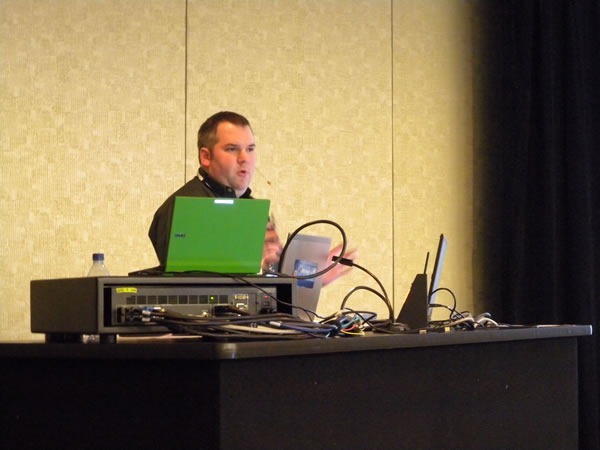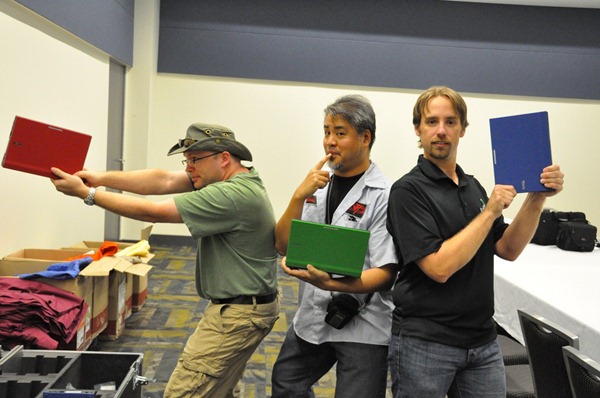“The Horror! The Horror!”
 “d00d,” began the capitalization- and punctuation-free email I received on Sunday, “coding horror atwood is totaly [sic] waling on ur azz”. Curious to see exactly how Jeff was “waling on my azz”, I pointed my browser at his blog, Coding Horror, one of the “800-pound gorillas” of the tech blog scene and found his latest article, titled A Democracy of Netbooks.
“d00d,” began the capitalization- and punctuation-free email I received on Sunday, “coding horror atwood is totaly [sic] waling on ur azz”. Curious to see exactly how Jeff was “waling on my azz”, I pointed my browser at his blog, Coding Horror, one of the “800-pound gorillas” of the tech blog scene and found his latest article, titled A Democracy of Netbooks.
In A Democracy of Netbooks, Jeff rebuts an article of mine from late last May, Fast Food Apple Pies and Why Netbooks Suck. The thesis of my article was that netbooks occupied an unhappy, “worst of both worlds” middle ground between smartphones and notebook computers: a bit too big to fit in your pocket, a little too small to do a lot of work on, and sadly underpowered. As I summed it up, “netbooks are like laptops, but lamer”.
Jeff argues that netbooks are the opposite. He says that by virtue of their low cost, they’re a democratizing force that provide computing and communicative power to all. Unlike smartphones, you’re not at the mercy of a phone company’s monthly fees or contracts (and remember, I’m in Canada, the only country in the world where 3-year mobile contracts exist). “Netbooks aren’t an alternative to notebook computers,” he writes, they are the new computers.”
Unfortunately, Jeff missed my follow-up to Fast Food Apple Pies and Why Netbooks Suck, in which I explained the motivation behind the article:
I feel that there’s a little too much excitement about netbooks at Microsoft. I think that part of it stems from the old company mantra, “a computer on every desktop and in every home”. The PC is the Goose that Laid the Golden Egg, and the closer that a device is to the PC, the more Microsoft “gets” it. I feel that Microsoft sees the netbook as an exciting new space, where I see them as smaller, less powerful laptops. I think that eventually, as technology catches up, netbooks will simply be considered “computers” – just on the small end of the PC size spectrum, and that Microsoft should treat them as such.
The article is also an open letter to Microsoft stating my concern that netbooks are a dangerous red herring distracting us from where the real potential in mobile computing is: the smartphone. It’s an area where Microsoft had an early lead and dropped the ball. It’s an area where I feel that Microsoft is showing a lack of vision, from Steve Ballmer’s ill-considered dismissal of the iPhone (“There’s no chance that the iPhone is going to get any significant market share. No chance.”) to Windows Mobile 6, which feels as though it was half-assedly slapped together by PDA designers frozen in an iceberg in 2000.
Still, I’m glad that Jeff found my article worth writing about and happy to see that it’s started some discussion.
Ooh! Free Netbook!
As the hardware sponsor of the Canadian version of Techdays – Microsoft’s cross-country, seven-city tools and technology training conference – Dell provided us with a number of computers, including about a dozen of Latitude 2100 netbooks. They performed yeoman service as hosts for a rotating slide deck that we’d display between conference sessions, in both the presentation theatres as well as in the hallways.
Here’s what they look like when artfully posed by a photographer for the marketing material:

By the bye, those bodies are rubberized and have a cross-hatched pattern.
Here’s one of the netbooks in action, quietly working as Dylan Smith makes his presentation at TechDays Winnipeg:

…and here are IT Pro Evangelist Rick Claus, me and IT Pro Evangelist Rodney Buike striking a “Charlie’s Angels” pose with the three colours of netbooks we were provided:

On December 16th, 2009 at 4:00 p.m., the very moment that TechDays Winnipeg ended, the netbooks were retired from conference service and all the evangelists team got to pick one. Although I’d rather have been assigned the “Dellasaurus” – a 17” monster with quad-core chip and 16 gigs of RAM — I’m not the type to turn up his nose at being assigned another computer. I chose one of the Kermit-the-Frog-green ones.
The Experiment

Thus far, my netbook has been relegated to ebook-reading duty and little else, but in light of Jeff’s article, I figured that this might be an opportunity to put it to the test. What if I were to set aside a week to use the netbook as my one and only machine in my day-to-day work and life? Would I be pleasantly surprised, driven mad, or neither?
Starting on Sunday and continuing through to next Saturday, I will use the Dell Latitude 2100 exclusively. This should be an interesting test, as I will be working in a number of places:
- At my home office
- At HacklabTO, the Toronto “hackerspace” where I’m a member and which I often use as a coworking space
- At a meeting with a client
- On the road: I’ll be flying to Montreal to attend CUSEC (Canadian University Software Engineering Conference) as a sponsor representative and host of DemoCamp. This should be a good test of the netbook under the conditions where it’s supposed to shine.
By the way, does anyone know what the Canadian domestic flight carry-on restrictions are in the wake of the Underwear Bomber?
Here are its specs:
- Processor: Intel Atom N270 running at 1.6GHz with 512K L2 cache and 533MHz bus
- Chipset: Intel 945 PM/GS Express
- Graphics: Intel Integrated GMA 950
- Display: 10.1” WSVGA 1024 by 600 LED display
- Other Goodies:
- Integrated webcam
- Single-touch screen
- RAM: 2GB (1GB on-board plus 1GB in the memory slot)
- Hard Drive: 160GB, 5400 RPM
- Wifi: Intel WiFi Link 5100 802.11 a/g/n mini card
- Battery: 3-cell (there’s a 6-cell available)
When benchmarked using the Windows Experience Index, it yielded a base score of 2.0. Here are its Windows Experience Index subscores (the index rates components on a scale of 1.0 to 7.9):
- Processor: 2.1
- Memory: 4.5
- Graphics: 2.0
- Gaming graphics: 3.0
- Primary hard disk: 5.3
Since the netbooks were being used as secondary PowerPoint machines for TechDays, they already had the following installed on them:
The software selection above is probably the sort of thing that most office workers (and students, the market at whom the Latitude 2100 is aimed) would use from day to day. In addition to these apps, I installed some of the tools of the developer evangelist trade:
I’ll report on my experiences using the netbook as my primary machine regularly and tell you about the good, the bad and the ugly (or beautiful, because one never knows).
I have only one question: Jeff, do you want to try the same thing?
This article also appears in Canadian Developer Connection.
 In case you hadn’t read my article from Friday, I’m conducting a little experiment this week – I’m seeing what it’s like to use a “netbook“ computer (a Dell Latitude 2100, to be specific) as my primary machine for the whole week. I’m trying this out as a response to Jeff “Coding Horror” Atwood’s article, in which he rebuts my argument that the computers we typically classify as “netbooks”, occupy a neither-here-nor-there, worst-of-both-worlds middle ground between smartphones and laptop computers.
In case you hadn’t read my article from Friday, I’m conducting a little experiment this week – I’m seeing what it’s like to use a “netbook“ computer (a Dell Latitude 2100, to be specific) as my primary machine for the whole week. I’m trying this out as a response to Jeff “Coding Horror” Atwood’s article, in which he rebuts my argument that the computers we typically classify as “netbooks”, occupy a neither-here-nor-there, worst-of-both-worlds middle ground between smartphones and laptop computers.![]() As a Developer Evangelist for Microsoft, one of the tools I use most often is Visual Studio, the integrated development environment that’s typically used for developing applications for Microsoft-based platforms, from the desktop to web applications hosted on Windows Server, to mobile apps for Windows Phone and Zune to console apps for the Xbox 360. I currently run both Visual Studio 2008 and Beta 2 of Visual Studio 2010.
As a Developer Evangelist for Microsoft, one of the tools I use most often is Visual Studio, the integrated development environment that’s typically used for developing applications for Microsoft-based platforms, from the desktop to web applications hosted on Windows Server, to mobile apps for Windows Phone and Zune to console apps for the Xbox 360. I currently run both Visual Studio 2008 and Beta 2 of Visual Studio 2010.![]() On the other hand, Visual C# Express 2008 and Visual Web Developer 2008 work just fine. I’m having no trouble building apps in ASP.NET MVC, Silverlight or XNA and experiencing no slow-downs. It remains to be seen if the final versions of Visual Studio 2010 with their final optimizations will run without the slowdowns.
On the other hand, Visual C# Express 2008 and Visual Web Developer 2008 work just fine. I’m having no trouble building apps in ASP.NET MVC, Silverlight or XNA and experiencing no slow-downs. It remains to be seen if the final versions of Visual Studio 2010 with their final optimizations will run without the slowdowns. “d00d,” began the capitalization- and punctuation-free email I received on Sunday, “coding horror atwood is totaly [sic] waling on ur azz”. Curious to see exactly how Jeff was “waling on my azz”, I pointed my browser at his blog,
“d00d,” began the capitalization- and punctuation-free email I received on Sunday, “coding horror atwood is totaly [sic] waling on ur azz”. Curious to see exactly how Jeff was “waling on my azz”, I pointed my browser at his blog, 



